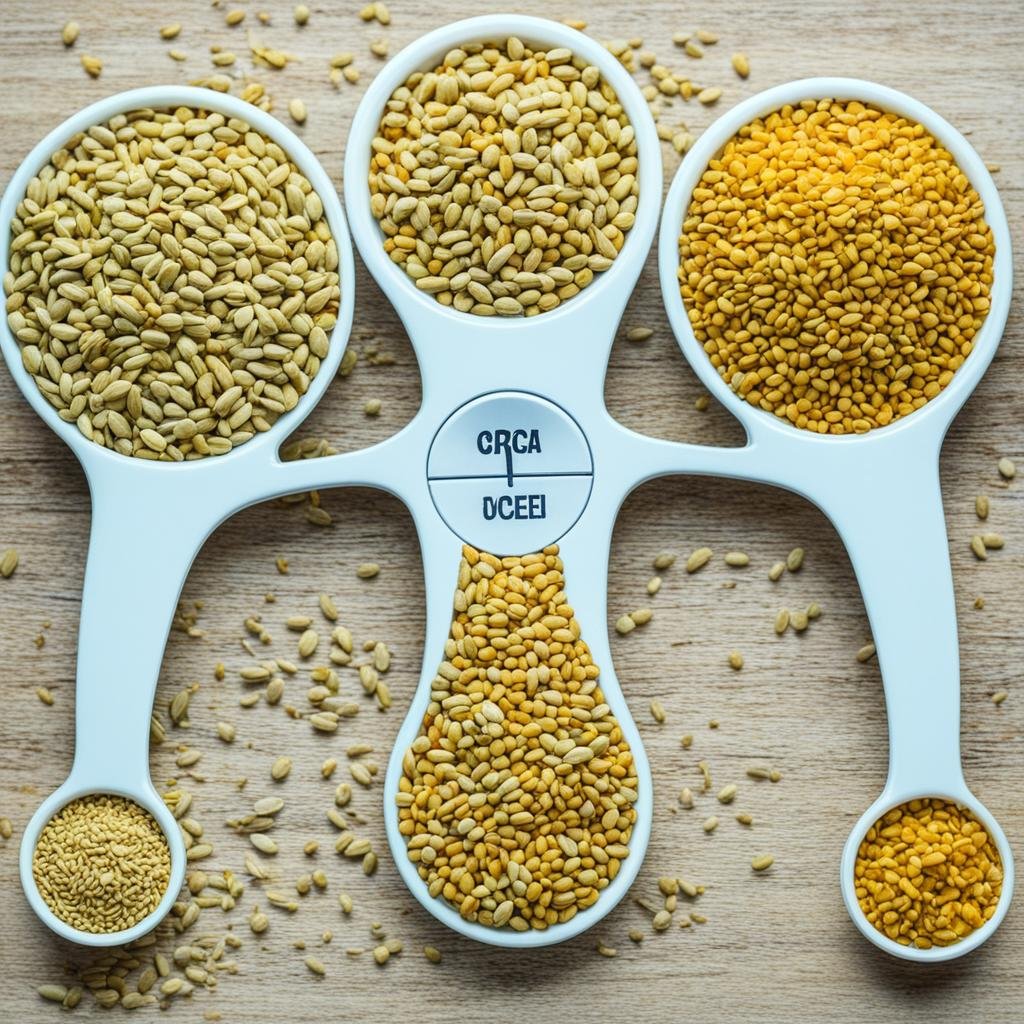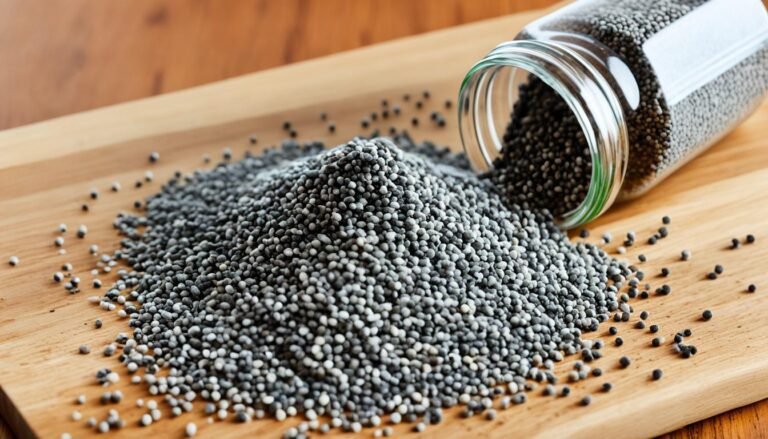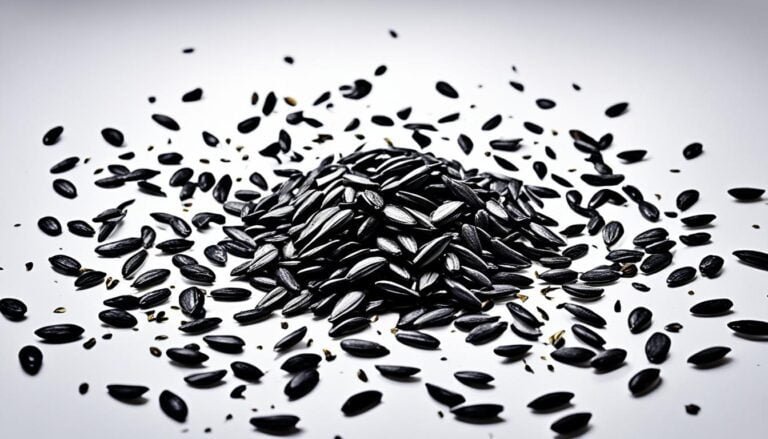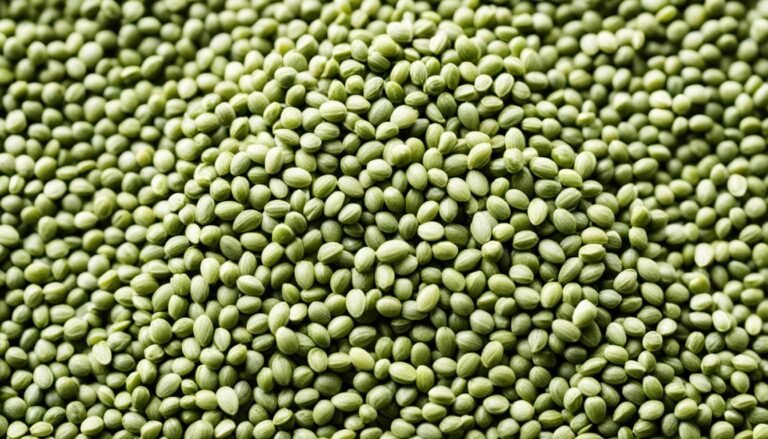Fenugreek Advantages and Disadvantages: A Full Guide

Did you know that fenugreek seeds are packed with 33% of the daily iron you need per 100 grams? This powerful herb belongs to the legume family. It’s full of potential health benefits that are starting to be discovered. Fenugreek helps control blood sugar and boosts breast milk production, showing its wide range of uses.
But, like any supplement, it has its downsides and side effects. In this detailed guide, we’ll explore the good and the bad of adding fenugreek to your daily life.
What is Fenugreek?
Overview and Key Facts
Fenugreek, known as Trigonella foenum-graecum L., is an herb in the legume family. It has active parts like galactomannan fiber, saponin, and hydroxyisoleucine. These parts help with its health benefits. In the United States, fenugreek is legal and safe, as said by the FDA.
You can find fenugreek in many forms, like leaves, seeds, powders, and extracts. It comes from the Mediterranean and has been used for centuries in medicine and food. Its unique smell and taste make it a favorite in Indian and Middle Eastern cooking.
| Fenugreek Key Facts | Fenugreek Plant Facts |
|---|---|
| Contains active ingredients like galactomannan fiber, saponin, and hydroxyisoleucine Considered a legal substance and generally recognized as safe (GRAS) by the FDA Available in various forms, including cooked leaves, raw seeds, powders, and extracts Native to the Mediterranean region and used in traditional medicine and cuisine Has a distinctive aroma and slightly bitter taste | Belongs to the legume family Can grow up to 2 feet tall Produces small, white flowers and long, slender pods Seeds are small, yellow-brown, and have a triangular shape Leaves are trifoliate and have a similar appearance to clover |
Learning about fenugreek can help you see its value. Whether you like cooking or using it for health, understanding fenugreek can be very rewarding.
Potential Health Benefits of Fenugreek
Blood Sugar Control
Research is showing that fenugreek could help manage blood sugar levels. Studies looked into how fenugreek might help with blood glucose. It seems to lower fasting and after-meal blood glucose, and even the average blood sugar over time.
This could be thanks to its fiber, saponin, and hydroxyisoleucine. These might slow down how quickly carbs are absorbed. But, we need more solid research to be sure.
A 2016 review found that fenugreek really did lower blood sugar in people with diabetes or prediabetes. High blood sugar can lead to serious health issues like nerve damage, heart disease, and kidney disease. Keeping blood sugar in check is key to avoiding these problems.

Though the signs look good, we need more studies to fully grasp how fenugreek works on blood sugar control. It could be a big help for those with diabetes or prediabetes. Always talk to a doctor before adding fenugreek to your health plan.
Cholesterol-Lowering Properties
Fenugreek is packed with fiber and saponin, which can help lower cholesterol. Studies show that fenugreek cholesterol lowering can reduce total cholesterol, LDL cholesterol, and triglycerides. It might also boost HDL cholesterol, known as “good” cholesterol.
The fenugreek for high cholesterol benefits come from its ability to stop cholesterol from being absorbed and made in the body. This can lead to a better fenugreek lipid profile. It could be a natural way for people to manage their cholesterol.
Even though the results look promising, we need more research, especially in people with high cholesterol. Adding fenugreek to your diet or supplements could be a natural way to keep cholesterol healthy. But, always talk to your doctor before trying new supplements.
Fenugreek for Breast Milk Production
Fenugreek is a plant that has been used for a long time in traditional medicine. It is now being looked at for its potential to increase breast milk production. This plant may help nursing parents by boosting milk supply and supporting healthy weight gain in babies.
Studies on fenugreek and its effects on breast milk production have given mixed results. Some studies show a big increase in milk volume after taking fenugreek supplements. But, other studies found no difference. Still, many breastfeeding parents say fenugreek has helped them increase their milk supply.
A 2018 study found that fenugreek helped increase breast milk production. Another 2018 study showed that a mix of fenugreek, ginger, and turmeric raised milk volume by 49% at week 2 and 103% at week 4 compared to a placebo group.
Fenugreek is usually safe, but it’s important to know about possible side effects and interactions. Diarrhea is a common side effect that can affect both the parent and the baby if too much is taken too fast. It can also interact with blood thinners and diabetes medications, so talking to a healthcare provider before using it is important.
In conclusion, fenugreek might help increase breast milk production, but the research isn’t clear. If you’re thinking about using fenugreek, talk to your healthcare provider and watch how you and your baby react to it.
| Key Fenugreek Facts | Details |
|---|---|
| Galactagogue Properties | Fenugreek has been traditionally used as a natural substance to increase breast milk production. |
| Research Findings | Studies have shown mixed results, with some demonstrating a significant increase in milk volume and others finding no notable difference. |
| Safety Considerations | Fenugreek is generally safe, but potential side effects include diarrhea, gas, and interactions with certain medications. |
| Dosage and Consumption | Recommended dosages vary, with options including capsules, tea, and other forms. Consulting a healthcare provider is advised. |
When looking to boost your fenugreek milk supply or fenugreek for breastfeeding, the research suggests it might be worth trying. But, how it affects each person can differ. Always talk to your healthcare provider to find the best and safest way for you.

Menstrual Cramp Relief
Looking for relief from menstrual cramps, or dysmenorrhea, is common. Research on fenugreek’s benefits is still growing. While some studies hint at its potential, the evidence is not strong enough yet.
A review looked into fenugreek and other supplements for menstrual cramp relief. It found not much solid data on fenugreek’s safety and effectiveness. We need more studies to see if fenugreek can really help with fenugreek for menstrual cramps, fenugreek for dysmenorrhea, and fenugreek for period pain.
Some women say taking fenugreek supplements means they need less pain medicine. This suggests fenugreek might be useful for fenugreek for menstrual cramps relief. A study on a specific fenugreek extract, Vitagnus, showed promising results for menstrual cramp relief.
But, the research on fenugreek for fenugreek for dysmenorrhea is still limited. We need more clinical trials to understand how fenugreek can help with menstrual cramps and discomfort.
If you have bad or ongoing menstrual cramps, talk to your doctor. They can suggest proven treatments like pain relievers, hormonal birth control, and other therapies. While we look for natural ways to ease fenugreek for period pain, be careful not to rely solely on fenugreek for relief.
Polycystic Ovary Syndrome (PCOS) Management
Polycystic ovary syndrome (PCOS) affects about 4-6% of women who can have babies. It’s a hormonal condition that brings on symptoms like irregular periods and too much hair. Women with PCOS are also at higher risk for type 2 diabetes and heart disease.
Clinical Trial Findings
Managing PCOS is tough, but fenugreek might help. A small study found that fenugreek seed extract, called Furocyst, made ovarian cysts smaller and helped with regular periods. But, it didn’t improve blood sugar, triglycerides, or HDL cholesterol levels much.
This is good news, but we need more studies with more people to be sure about fenugreek‘s benefits for PCOS. For now, women with PCOS might consider adding fenugreek to their treatment plan. This plan could also include changing their lifestyle and trying other natural supplements like cinnamon, flaxseed, and spearmint tea.

Fenugreek Advantages and Disadvantages
Fenugreek is a versatile herb with many fenugreek benefits and risks. It’s usually safe, but its safety is not fully known due to limited studies.
Here are some key fenugreek pros and cons to know:
- Digestive Issues: Some people may experience mild digestive problems like gas, bloating, or diarrhea after eating fenugreek.
- Allergic Reactions: Rarely, serious allergic reactions can happen in people allergic to legumes.
- Liver Problems: Fenugreek might harm the liver in some, especially those with liver issues already.
- Low Blood Sugar: It can lower blood sugar levels, which is a concern for diabetics or those on certain meds.
- Low Potassium Levels: Eating fenugreek can lower potassium levels, which is a worry for certain health conditions or medication users.
Because of these fenugreek benefits and risks, be careful when using it in your diet or supplements. This is especially true if you’re pregnant, breastfeeding, a child, or have health issues. Always talk to a healthcare professional before adding fenugreek to your diet.
| Fenugreek Nutrient Content (per 100g) | Amount |
|---|---|
| Energy | 323 kcals |
| Fat | 6.41g |
| Carbohydrates | 58g |
| Dietary Fiber | 24.6g |
| Protein | 23g |
| Iron | 33.53mg |
| Calcium | 176mg |
| Sodium | 67mg |
| Potassium | 770mg |
| Copper | 1.11mg |
| Magnesium | 191mg |
| Phosphorus | 296mg |
| Zinc | 2.50mg |
While fenugreek has many fenugreek uses and side effects, it’s important to consider both sides. Always talk to a healthcare professional before adding it to your routine.

Asthma Treatment
If you have mild asthma, fenugreek might be a natural way to help you. A small study showed that adding fenugreek syrup to usual treatments like albuterol could be beneficial.
The study found that people with mild asthma who used fenugreek had lower inflammation markers. They also breathed easier and felt better in their daily lives than those who didn’t take fenugreek. But, we need more studies to be sure about using fenugreek for asthma as a treatment.
If you’re thinking about fenugreek asthma treatment, talk to your doctor first. They can tell you if fenugreek as an asthma supplement is right for you. They can also guide you on how much to take and any possible side effects.
Remember, even though fenugreek might help, it shouldn’t replace your doctor’s treatment plan. Always work with your healthcare team to manage your asthma safely and effectively.
Sexual Health Benefits
Fenugreek may help with sexual health for both men and women. For men, a special extract from fenugreek called Testofen can boost erectile function and libido. It does this when taken with other supplements. This could be because fenugreek helps increase testosterone levels.
Women may also benefit from fenugreek. A cream made with fenugreek has shown to help with vaginal atrophy symptoms. This condition, common after menopause, causes dryness and discomfort, reducing sexual function. The cream could help ease these symptoms, but more studies are needed.
The research on fenugreek’s benefits for sexual health is growing. It looks promising for both men and women. But, always talk to a healthcare provider before trying fenugreek supplements. This is especially true if you have health issues or are on other medications.
Side Effects and Safety Concerns
Possible Side Effects
Fenugreek is usually safe, but it can cause some side effects. Common fenugreek side effects include digestive issues like diarrhea, stomach upset, and gas. Serious fenugreek adverse reactions include severe allergic reactions, liver problems, low blood sugar, low potassium levels, and worsening of asthma symptoms.
People with certain health conditions should be careful with fenugreek. This includes pregnant or breastfeeding women, children, and those with liver issues or severe legume allergies. Always talk to your doctor before using fenugreek, especially if you’re on other medications.
| Potential Side Effects of Fenugreek | Frequency |
|---|---|
| Digestive Issues (Diarrhea, Stomach Upset, Gas) | Common |
| Allergic Reactions | Uncommon |
| Liver Problems | Rare |
| Low Blood Sugar | Rare |
| Low Potassium Levels | Rare |
| Worsening of Asthma Symptoms | Rare |
Knowing about these fenugreek safety concerns is important. Talk to your healthcare provider before adding fenugreek to your health routine.
Dosage and Interactions
There are no set guidelines for fenugreek dosage because research is limited. The most you should take daily is 21 grams to avoid too much. Some supplements might have up to 100 grams. Usually, people take fenugreek supplements in amounts of 1 to 5 grams.
Always talk to your healthcare provider before starting fenugreek. It can interact with some medicines, like diabetes drugs and blood thinners. Be careful with other herbs and supplements that can change blood sugar or how well blood clots.
| Nutrient | Amount per Serving (1 Tbsp) |
|---|---|
| Protein | 2.5 grams |
| Fat | 0.7 grams |
| Carbohydrates | 6.5 grams |
| Dietary Fiber | 2.7 grams |
| Sodium | 7.4 milligrams |
| Potassium | 85.5 milligrams |
Taking fenugreek might cause diarrhea, gas, make asthma worse, or increase sweating. Also, if you’re allergic to peanuts, fenugreek could cause problems because of a similar reaction.
Conclusion
Fenugreek is a versatile herb with lots of potential in health. It helps with blood sugar and cholesterol levels. Researchers and health fans are taking notice.
It also helps with breast milk, menstrual cramps, and sexual health. But, we need more studies to fully understand its benefits and risks.
Fenugreek is usually safe, but it can have side effects. It might also affect certain medicines. If you want to try fenugreek, talk to your doctor first. They can tell you if it’s right for you.
In summary, key takeaways fenugreek show many benefits. But, we need more research to know its full fenugreek advantages and disadvantages. With your doctor’s help, you can decide if fenugreek is good for you.
FAQ
What are the advantages and disadvantages of using fenugreek?
Fenugreek might help control blood sugar and lower cholesterol. It could also boost breast milk production and improve sexual health. But, it might cause digestive problems, allergic reactions, and affect certain medications. We need more studies to understand its safety and effectiveness.
What are the key health benefits of fenugreek?
Fenugreek might help manage blood sugar and cholesterol levels. It could also increase breast milk production and support sexual health. The herb has compounds like galactomannan fiber, saponin, and hydroxyisoleucine that might be behind these benefits.
Can fenugreek help with menstrual cramps?
There’s not much proof that fenugreek helps with menstrual cramps. We need more studies to see if it can ease these symptoms.
How does fenugreek affect polycystic ovary syndrome (PCOS)?
A study showed that fenugreek seed extract might shrink ovarian cysts and help with menstrual cycles in PCOS patients. But, we need more research with bigger groups to confirm these findings.
What are the potential side effects of using fenugreek?
Fenugreek might cause digestive issues like diarrhea and stomach discomfort. It could also lead to severe allergic reactions, liver problems, low blood sugar, low potassium, and worsen asthma. It’s best used with care, especially for pregnant or breastfeeding women, children, and those with liver issues or severe legume allergies.
What is the recommended dosage of fenugreek?
There’s no set dosage for fenugreek due to limited research. Taking more than 21 grams a day could be harmful. Supplements may offer 1 to 5 grams daily. Always talk to a healthcare provider before using fenugreek, as it could interact with some medicines.







One Comment